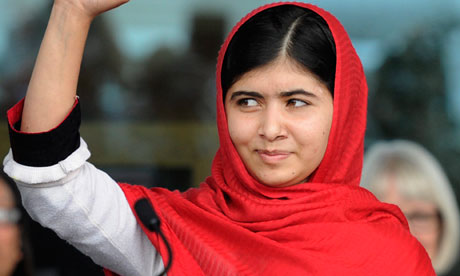Of course, education can make the world a better place, but
what happens when education makes people blind? Recent Nobel Peace Prize
winner, Malala Yousafzai, said at the UN just last year that "One child,
one teacher, one book & one pen can change the world", and it
definitely can. There is no doubt in my mind that open education to the masses
is better for everyone, globally, for future economic, cultural and social
prosperity, but when 'education' becomes a ploy, it renders the campaign
useless.
I am not doubting the worth of Malala's campaign, nor am I criticizing her on a personal level, rather serving to open the eyes of those who seem to have idolized Malala, and put her up on a pedestal. The point of this article is to question how Malala is more important than any other activist or campaigner, or even any other celebrity.
I am not doubting the worth of Malala's campaign, nor am I criticizing her on a personal level, rather serving to open the eyes of those who seem to have idolized Malala, and put her up on a pedestal. The point of this article is to question how Malala is more important than any other activist or campaigner, or even any other celebrity.
The bullet that hit her seems to have done her more good
than harm – she has been raised to such heights that the only way is down, down,
down. Malala is, of course, one of many people from developing countries who
are protesting for other worthwhile causes, in which case, why does the one
bullet and an international outpouring of sympathy justify the benefit that she
now receives as a result of that shooting. If anything, the Taliban have only
served to give her a new lease of life: Malala now lives in an opulent area of
Birmingham, in a house that others could only dream of living in; she attends a
private school which people without bullets in their head could barely afford
one month’s tuition fee; and her entire extended family have been granted
permanent refuge in the UK without any restrictions. Why would she/they ever
even think about going back to their home country when the British government
has given them all anyone else could only dream of?
By placing Malala on such a prominent platform undermines
the work and activism of other campaigners as well as undermining the disastrous
situation in other downtrodden and oppressed areas such as the SWAT valley that
Yousafzai originates from. Hundreds and thousands of people have been killed by
the Taliban in the tribal areas of Pakistan (inc. SWAT) as well as from drone
strikes, but still, it is only Malala’s plight that is highlighted. How is it
fair that one person’s situation is deemed more important than that of other
people, who are likely in a more dire situation than her?
How is the Taliban shooting Malala any different than the
celebrities who doused themselves with buckets of ice-cold water during the
summer? After all, they too were campaigning for an important cause, more
specifically ALS awareness.
Just yesterday, Malala was placed at #18 on TIME Magazine’s
list of ‘Most Influential Teens’ coming behind figures such as singer-songwriter
Lorde, Sasha and Malia Obama, Kendall and Kylie Jenner, amongst others.
Interestingly, on this list of influential teens was a young man by the name of
Erik Finman, aged 15, who too advocated for education, alongside whom was a
girl named Salma Kakar, aged 17, who is part of the Afghan National Cycling
Team, with similar aims as Malala in female empowerment, however both of these
teens activism never reached the heights that have been attributed to Malala.
Instantaneously, when the list of ‘Most Influential Teens’ was revealed, the status of the others on the list was critiqued, for example the status and validity of the Jenner sisters as well as the Obama sisters. The Jenners and Obamas have worked hard to achieve this status, whatever route/field they work in and thus these various cases only serve to reinforce my previous point of undermining the value of others’ work.
Instantaneously, when the list of ‘Most Influential Teens’ was revealed, the status of the others on the list was critiqued, for example the status and validity of the Jenner sisters as well as the Obama sisters. The Jenners and Obamas have worked hard to achieve this status, whatever route/field they work in and thus these various cases only serve to reinforce my previous point of undermining the value of others’ work.
As mentioned in a previous post, Malala’s role is not just
in the realm of education activism but she is also a ploy in the political push
and pull in international relations, with many criticising her because she is
willingly being used to influence the foreign policies of respective nations
(e.g. US, UK and Pakistan), potentially even achieving her dreams of being the
Pakistani Prime Minister, with, of course, previous colonial powers, such as
the UK, pushing the buttons, using her as a puppet to achieve their own
interests.
